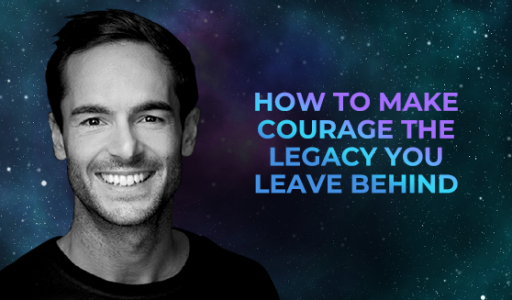
When someone stands up in front of a group of people and speaks openly about their personal experiences and inner struggles, you know they’ve overcome fear in their life. And that’s exactly what Julian Pistone (Regional Industry Manager at Google) did during his keynote at #LEAP22 – he stood up on the stage to inspire us with his vulnerability, and with his courage.
Because courage was what Pistone came to talk about. He shared personal stories, and stories from people who’ve inspired him. And he gave us three simple ways to start being more courageous in our own lives.
What’s this got to do with tech? Well, a lot. Because right now, tech innovations are changing our world – and they’ll continue to do so, probably quite drastically, over the coming years. Everyone working in tech needs to connect with their courage so that we can all drive our industry towards positive impact, and positive change.
Pistone put it like this:
“We have a duty to step forward and lead when others are hiding at the back of the room. We have a duty to dare when others are playing it safe. We have a duty to disrupt when others are hesitant. And we’ve been called to make a difference. And if we don’t, then we deprive the world of something.”
Courage as a skill
Before we share Pistone’s three courage-building discoveries with you, we want to make sure we’re all on the same page about what courage actually is. Because it’s not about being a hero, stepping into battle, or appearing fearless – true courage actually requires you to feel and acknowledge your own fears and limitations.
Also, courage isn’t a quality that some people are born with and others aren’t. Courage is a skill.
Former U.S. senator John McCain, who was a prisoner of war in North Vietnam for over five years, once defined courage as a spontaneous experience that can’t be trained for: “that rare moment of unity between conscience, fear, and action, when something deep within us strikes the flint of love, of honor, of duty, to make the spark that fires our resolve.”
And that sounds great. But it reflects an idealised notion of the mythical, instinctive hero that doesn’t take into account the web of emotions, and the depth of personal training, that can contribute to courageousness. Especially when we’re talking about courageousness in business, or in tech – because the kind of courage that drives us to take entrepreneurial risks and put our ideas and inventions on the line isn’t impulsive, and it doesn’t happen without practice.
Instead of fearless heroes, the courageous people in tech are those who feel their fear, own it, and do the scary thing anyway.
In psychology and behavioural science, courage is often defined like this (from a study in the Journal of Anxiety Disorders): “persistence or perseverance despite having fear. It takes courage to engage and persist in a terrifying activity. By definition, fear is necessary for someone to display courage.”
Pistone said, “I grew up thinking either you are courageous or you’re fearful. Either I am brave, or I’m a coward…this couldn’t be further from the truth. The bravest people are, in fact, intimate with fear.”
If you’re not scared of the thing, then doing the thing isn’t brave. And doing the thing even though you’re scared is a skill you can practise. You can become more courageous. How? By doing things that elicit a fear response in you; that make you feel vulnerable, and that are outside the boundaries of your comfort zone.
Supporting this idea, a survey conducted for a Forbes Insights Report back in 2015 found that emotional courage tends to increase with age. Using an index designed to measure various kinds of courage (including social, moral, emotional, and intellectual), researchers found that while most types of courage are relatively stable across age groups, the emotional courage score averaged from the low to mid 40s for the youngest surveyed groups, but rose to as high as 71.68 for those aged 65 and older.
Why? Probably because they’d had more time to get up close and personal with fear.
Three ways to build courage
By overcoming challenges in his own life and delving into the depths of historical, philosophical, and scientific perspectives on bravery and fear, Pistone uncovered three principles that help to build courage.
They are:
-
From adversity comes greatness.
The greatest challenges of your life and work also offer the most potential for you to become great.
To illustrate this, Pistone talked about the Japanese art of Kintsugi. Sometimes called ‘the art of resilience’, it’s the practice of repairing cracks and breaks in ceramic objects with gold. “What has your Kintsugi been, in your lifetime,” Pistone asked, “and how has it made you braver?”
-
Step up for others.
Putting others first allows us to overcome fear far more easily than when we’re only acting for ourselves. So stand up for those who aren’t able to stand up for themselves – and use your voice to amplify the stories and needs of those who’ve been silenced.
From a tech perspective, this means taking another look at what you’re creating, and why. Who is particular technology helping? What positive changes could it contribute to? If you tap into the deeper purpose behind your work, you’ll be able to lean into your fear (of failure, perhaps) with the confidence that you’re doing it for a reason.
-
Just GO!
Fear makes us stop. It wants us to hesitate long enough for self-doubt and self-preservation to kick in, and take control. Sometimes, the only way to be brave is to just do the thing. Even when you’re scared. And without giving the fear too much think-time in your head.
“The opposite of courage isn’t cowardice,” Pistone reminded us; “the opposite of courage is inaction.”
“Courage is a choice. Courage is a habit. And courage must be trained.”
Make courage the legacy you leave behind – not just in your personal life, but in the work you do in our industry. Infuse courage into the tech you create, and the ideas you invest in. Start doing small brave things regularly (and start today); and then when a big act of courage presents itself to you, you’ll be ready to respond.








